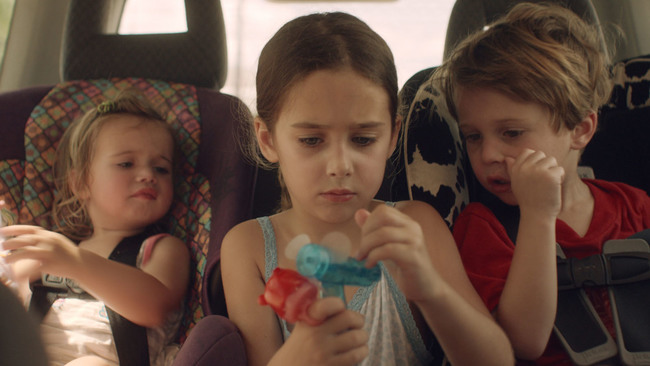Cannes 2018: Pre-Lineup News

Before the Cannes Film Festival rolls out its main lineup tomorrow, there are a couple of items to see to. From the festival itself today, there’s this year’s poster, as mentioned earlier, as well as the list of eight films competing for the Short Film Palme d’or and the Cinéfondation Selection of seventeen films (see below). Bertrand Bonello will preside over the jury selecting the winners from both lineups.
And then there’s this: “Ted Sarandos says Netflix won’t be going to Cannes this year,” reports Ramin Setoodeh. “In an exclusive interview with Variety, Netflix’s chief content officer says that the festival sent a clear message with a new rule that bans any films without theatrical distribution in France from playing in competition. Netflix could screen some of its upcoming movies out of competition, but Sarandos says that doesn’t make sense for the streaming service. ‘We want our films to be on fair ground with every other filmmaker,’ Sarandos says.”
On Monday, I outlined the parameters of the standoff between the streaming service and the festival. In the short term, this decision means that Orson Welles’s The Other Side of the Wind, whose completion and restoration were funded by Netflix, and Morgan Neville’s accompanying documentary They’ll Love Me When I’m Dead, as well as Alfonso Cuarón’s Roma, Paul Greengrass’s Norway, and Jeremy Saulnier’s Hold the Dark will not be seeing their premieres in Cannes.
As for the longer run, it seems that Cannes is caught between a rock (Netflix, which insists that its films and filmmakers be treated as fairly as anyone else’s) and a hard place (French filmmakers, theater owners, and unions who insist just as vehemently that the laws regulating distribution in France are in good part responsible for the relatively robust health of its national cinema—and who, we can safely assume, simply despise Netflix and all it stands for).
It’s with love and respect that I have to say, dear Notebook, that this tweet makes no sense: “Ultimately, Cannes does not need Netflix, and Netflix doesn’t need Cannes. Both organizations can (and should) move on from this.” As if these two entities operated in entirely different worlds? In a hypothetical Venn diagram, the overlap is already considerable, and most likely, it’ll only grow larger, not just dry up and blow away.
Bong Joon-ho premiered two films at Cannes, The Host (2006) and Mother (2009)—or two and a third, if you want to count Tokyo! (2008), the omnibus film he made with Leos Carax and Michel Gondry—before Netflix brought his Okja to last year’s Competition. The list of filmmakers whose work has been at home in Cannes—and ought to be in the future as well—who will also wish to or maybe even only be able to realize projects in partnership with Netflix—or Amazon, or Hulu, or Apple, and so on—will also carry on growing. It’s these filmmakers, the ones studios stopped supporting years ago, who will, for the time being, have to look to other festivals to premiere their work.
Short Films Competition
Oren Gerner’s Gabriel.
Raymund Ribas Gutierrez’s Judgement.
Celine Held and Logan George’s Caroline. Image at the top of the entry.
Saeed Jafarian’s Tariki.
Marta Pajeck’s III.
Masahiko Sato, Genki Kawamura, Yutaro Seki, Masayuki Toyota, and Kentaro Hirase’s Duality.
Wei Shujun’s On the Border.
Charles William’s All These Creatures.
Cinéfondation Selection
Ori Aharon’s Rubber Dolphin.
Zhannat Alshanova’s End of Season.
Louise Aubertin, Éloise Girard, Marine Meneyrol, Jonas Ritter, Loucas Rongeart, and Amandine Thomoux’s Sailor’s Delight.
Lucia Bulgheroni’s Inanimate.
Diego Céspedes’s The Summer of the Electric Lion.
Jamie Dack’s Palm Trees and Power Lines.
Di Shen’s The Storms in Our Blood.
Laura Garcia’s A Piece of Tragedy.
Constanza Gatti’s Five Minutes Outside.
Ariel Gutiérrez’s Hector’s Nightfall.
Eryk Lenartowicz’s Dots.
Marta Magnuska’s The Other.
Georgiana Moldoveanu’s Equally Red and Blue.
Pier Lorenzo Pisano’s As It Is on Earth.
Igor Poplauhin’s Calendar.
Arian Vazirdaftari’s Like a Good Kid.
Andrew Zox’s I Am My Own Mother.
Updates, 4/12: “Speaking at the lineup press conference this morning in Paris,” writes Andreas Wiseman for Deadline, “Frémaux said it was a ‘shame’ not to have movies backed by the streaming giant at the festival in some form, but that there had been ‘constructive dialogue with Netflix, contrary to appearances,’ and that Netflix remains ‘welcome in Cannes. . . . Last year when we had them on the red carpet we were very criticized. This year they won’t be on the red carpet and we’ll be criticized.’ . . . Cannes executive Pierre Lescure added on the Welles movie, ‘We regret it because it was a lovely gesture of cinema undertaken by Netflix and now they block it. It would have been a nice gesture but they didn’t want to do it. The debate is still open.’”
“I have to speak out for my father,” Beatrice Welles has written in an email to Sarandos, “portions of which were made available to Vanity Fair,” reports Rebecca Keegan. Beatrice Welles: “I saw how the big production companies destroyed his life, his work, and in so doing a little bit of the man I loved so much. I would so hate to see Netflix be yet another one of these companies.”
For Slate’s Sam Adams, “the battle between Netflix and Cannes presents something of an Alien vs. Predator conundrum.” On the one hand, “the manner in which Frémaux handed down the Cannes ban, at the same time as the festival announced it was putting the kibosh on red-carpet selfies, was high-handed and doctrinaire.” But “it’s also increasingly evident that Netflix doesn’t just want to ‘disrupt’ the business of showing movies in theaters. They want to destroy it.”
For news and items of interest throughout the day, every day, follow @CriterionDaily.



